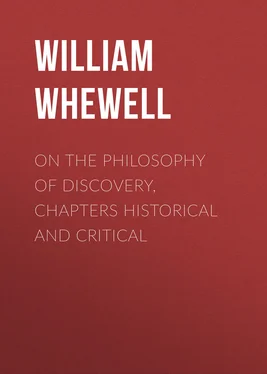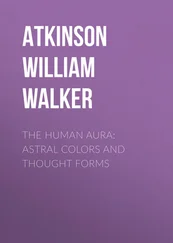William Whewell - On the Philosophy of Discovery, Chapters Historical and Critical
Здесь есть возможность читать онлайн «William Whewell - On the Philosophy of Discovery, Chapters Historical and Critical» — ознакомительный отрывок электронной книги совершенно бесплатно, а после прочтения отрывка купить полную версию. В некоторых случаях можно слушать аудио, скачать через торрент в формате fb2 и присутствует краткое содержание. Жанр: foreign_prose, foreign_religion, Философия, foreign_psychology, foreign_antique, на английском языке. Описание произведения, (предисловие) а так же отзывы посетителей доступны на портале библиотеки ЛибКат.
- Название:On the Philosophy of Discovery, Chapters Historical and Critical
- Автор:
- Жанр:
- Год:неизвестен
- ISBN:нет данных
- Рейтинг книги:5 / 5. Голосов: 1
-
Избранное:Добавить в избранное
- Отзывы:
-
Ваша оценка:
- 100
- 1
- 2
- 3
- 4
- 5
On the Philosophy of Discovery, Chapters Historical and Critical: краткое содержание, описание и аннотация
Предлагаем к чтению аннотацию, описание, краткое содержание или предисловие (зависит от того, что написал сам автор книги «On the Philosophy of Discovery, Chapters Historical and Critical»). Если вы не нашли необходимую информацию о книге — напишите в комментариях, мы постараемся отыскать её.
On the Philosophy of Discovery, Chapters Historical and Critical — читать онлайн ознакомительный отрывок
Ниже представлен текст книги, разбитый по страницам. Система сохранения места последней прочитанной страницы, позволяет с удобством читать онлайн бесплатно книгу «On the Philosophy of Discovery, Chapters Historical and Critical», без необходимости каждый раз заново искать на чём Вы остановились. Поставьте закладку, и сможете в любой момент перейти на страницу, на которой закончили чтение.
Интервал:
Закладка:
It may not be improper to observe here that this belief in the appointed progress of knowledge, is not combined with any overweening belief in the unbounded and independent power of the human intellect. On the contrary, one of the lessons which Bacon draws from the state and prospects of knowledge, is the duty of faith and humility. "To him," he says 74 74 Op. Maj. p. 476.
, "who denies the truth of the faith because he is unable to understand it, I will propose in reply the course of nature, and as we have seen it in examples." And after giving some instances, he adds, "These, and the like, ought to move men and to excite them to the reception of divine truths. For if, in the vilest objects of creation, truths are found, before which the inward pride of man must bow, and believe though it cannot understand, how much more should man humble his mind before the glorious truths of God!" He had before said 75 75 Op. Maj. p. 15.
: "Man is incapable of perfect wisdom in this life; it is hard for him to ascend towards perfection, easy to glide downwards to falsehoods and vanities: let him then not boast of his wisdom, or extol his knowledge. What he knows is little and worthless, in respect of that which he believes without knowing; and still less, in respect of that which he is ignorant of. He is mad who thinks highly of his wisdom; he most mad, who exhibits it as something to be wondered at." He adds, as another reason for humility, that he has proved by trial, he could teach in one year, to a poor boy, the marrow of all that the most diligent person could acquire in forty years' laborious and expensive study.
To proceed somewhat more in detail with regard to Roger Bacon's views of a Reform in Scientific Inquiry, we may observe that by making Mathematics and Experiment the two great points of his recommendation, he directed his improvement to the two essential parts of all knowledge, Ideas and Facts, and thus took the course which the most enlightened philosophy would have suggested. He did not urge the prosecution of experiment, to the comparative neglect of the existing mathematical sciences and conception; a fault which there is some ground for ascribing to his great namesake and successor Francis Bacon: still less did he content himself with a mere protest against the authority of the schools, and a vague demand for change, which was almost all that was done by those who put themselves forward as reformers in the intermediate time. Roger Bacon holds his way steadily between the two poles of human knowledge; which, as we have seen, it is far from easy to do. "There are two modes of knowing," says he 76 76 Ibid. p. 445, see also p. 448. "Scientiæ aliæ sciunt sua principia invenire per experimenta, sed conclusiones per argumenta facta ex principiis inventis. Si vero debeant habere experientiam conclusionum suarum particularem et completam, tunc oportet quod habeant per adjutorium istius scientiæ nobilis (experimentalis)."
; "by argument, and by experiment. Argument concludes a question; but it does not make us feel certain, or acquiesce in the contemplation of truth, except the truth be also found to be so by experience." It is not easy to express more decidedly the clearly seen union of exact conceptions with certain facts, which, as we have explained, constitutes real knowledge.
One large division of the Opus Majus is "On the Usefulness of Mathematics," which is shown by a copious enumeration of existing branches of knowledge, as Chronology, Geography, the Calendar and (in a separate Part) Optics. There is a chapter 77 77 Op. Maj. p. 60.
, in which it is proved by reason, that all science requires mathematics. And the arguments which are used to establish this doctrine, show a most just appreciation of the office of mathematics in science. They are such as follows:—That other sciences use examples taken from mathematics as the most evident:—That mathematical knowledge is, as it were, innate in us, on which point he refers to the well-known dialogue of Plato, as quoted by Cicero:—That this science, being the easiest, offers the best introduction to the more difficult:—That in mathematics, things as known to us are identical with things as known to nature:—That we can here entirely avoid doubt and error, and obtain certainty and truth:—That mathematics is prior to other sciences in nature, because it takes cognizance of quantity, which is apprehended by intuition, ( intuitu intellectus ). "Moreover," he adds 78 78 Ibid. p. 64.
, "there have been found famous men, as Robert, bishop of Lincoln, and Brother Adam Marshman (de Marisco), and many others, who by the power of mathematics have been able to explain the causes of things; as may be seen in the writings of these men, for instance, concerning the Rainbow and Comets, and the generation of heat, and climates, and the celestial bodies."
But undoubtedly the most remarkable portion of the Opus Majus is the Sixth and last Part, which is entitled "De Scientia experimentali." It is indeed an extraordinary circumstance to find a writer of the thirteenth century, not only recognizing experiment as one source of knowledge, but urging its claims as something far more important than men had yet been aware of, exemplifying its value by striking and just examples, and speaking of its authority with a dignity of diction which sounds like a foremurmur of the Baconian sentences uttered nearly four hundred years later. Yet this is the character of what we here find 79 79 "Veritates magnificas in terminis aliarum scientiarum in quas per nullam viam possunt illæ scientiæ, hæc sola scientiarum domina speculativarum, potest dare." Op. Maj. p. 465.
. "Experimental science, the sole mistress of speculative sciences, has three great Prerogatives among other parts of knowledge: First she tests by experiment the noblest conclusions of all other sciences: Next she discovers respecting the notions which other sciences deal with, magnificent truths to which these sciences of themselves can by no means attain: her Third dignity is, that she by her own power and without respect of other sciences, investigates the secret of nature."
The examples which Bacon gives of these "Prerogatives" are very curious, exhibiting, among some error and credulity, sound and clear views. His leading example of the First Prerogative, is the Rainbow, of which the cause, as given by Aristotle, is tested by reference to experiment with a skill which is, even to us now, truly admirable. The examples of the Second Prerogative are three:— first , the art of making an artificial sphere which shall move with the heavens by natural influences, which Bacon trusts may be done, though astronomy herself cannot do it—"et tunc," he says, "thesaurum unius regis valeret hoc instrumentum;"— secondly , the art of prolonging life, which experiment may teach, though medicine has no means of securing it except by regimen 80 80 One of the ingredients of a preparation here mentioned, is the flesh of a dragon, which it appears is used as food by the Ethiopians. The mode of preparing this food cannot fail to amuse the reader. "Where there are good flying dragons, by the art which they possess, they draw them out of their dens, and have bridles and saddles in readiness, and they ride upon them, and make them bound about in the air in a violent manner, that the hardness and toughness of the flesh may be reduced, as boars are hunted and bulls are baited before they are killed for eating." Op. Maj. p. 470.
;— thirdly , the art of making gold finer than fine gold, which goes beyond the power of alchemy. The Third Prerogative of experimental science, arts independent of the received sciences, is exemplified in many curious examples, many of them whimsical traditions. Thus it is said that the character of a people may be altered by altering the air 81 81 Op. Maj. p. 473.
. Alexander, it seems, applied to Aristotle to know whether he should exterminate certain nations which he had discovered, as being irreclaimably barbarous; to which the philosopher replied, "If you can alter their air, permit them to live, if not, put them to death." In this part, we find the suggestion that the fire-works made by children, of saltpetre, might lead to the invention of a formidable military weapon.
Интервал:
Закладка:
Похожие книги на «On the Philosophy of Discovery, Chapters Historical and Critical»
Представляем Вашему вниманию похожие книги на «On the Philosophy of Discovery, Chapters Historical and Critical» списком для выбора. Мы отобрали схожую по названию и смыслу литературу в надежде предоставить читателям больше вариантов отыскать новые, интересные, ещё непрочитанные произведения.
Обсуждение, отзывы о книге «On the Philosophy of Discovery, Chapters Historical and Critical» и просто собственные мнения читателей. Оставьте ваши комментарии, напишите, что Вы думаете о произведении, его смысле или главных героях. Укажите что конкретно понравилось, а что нет, и почему Вы так считаете.












